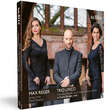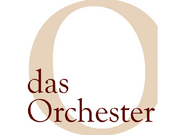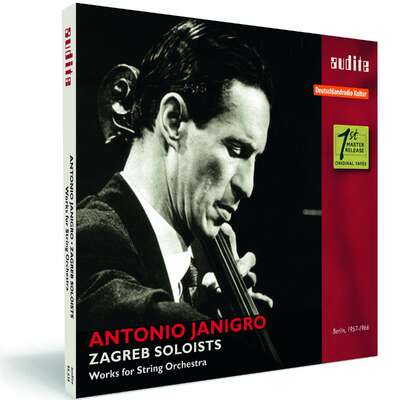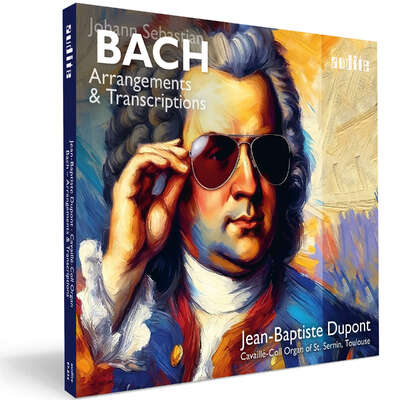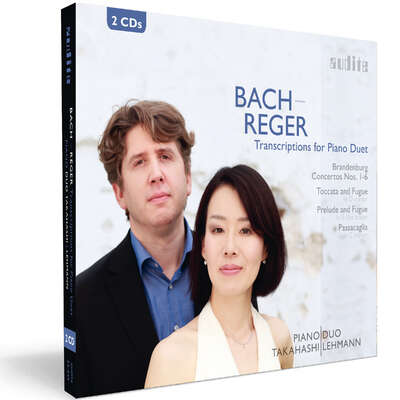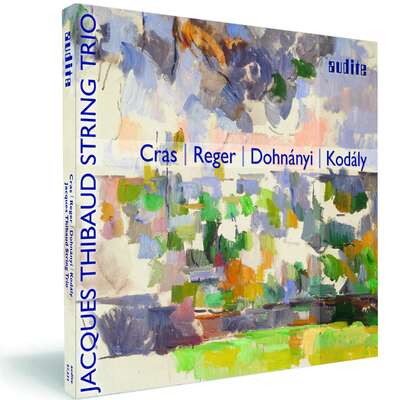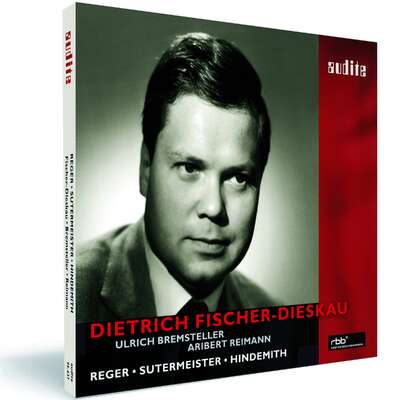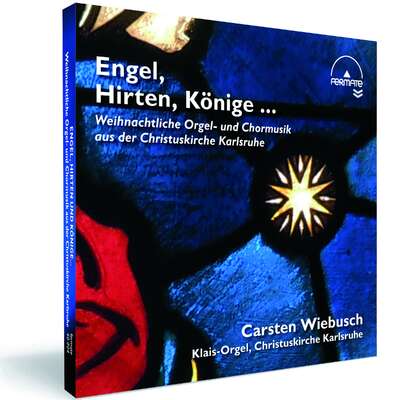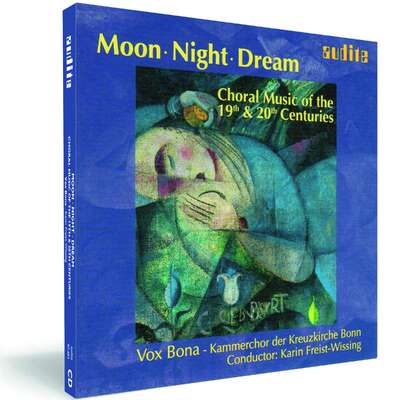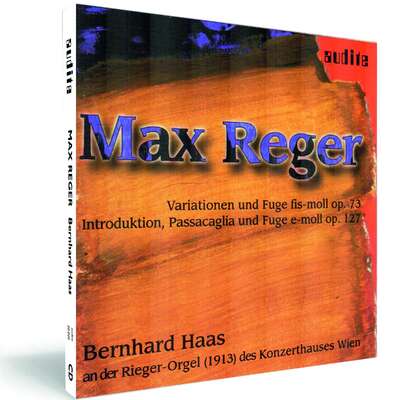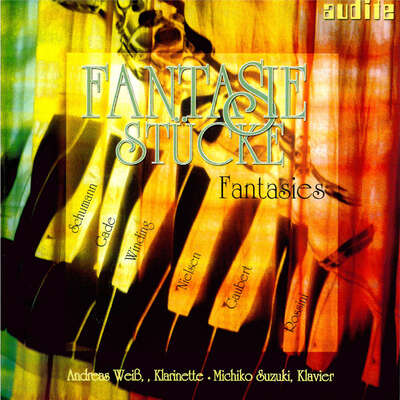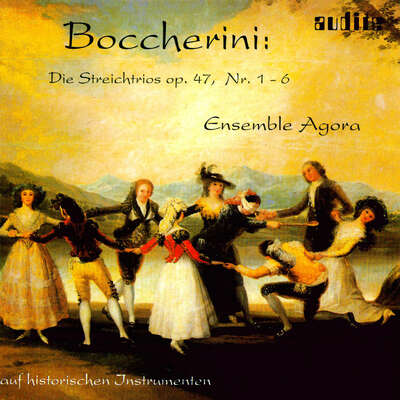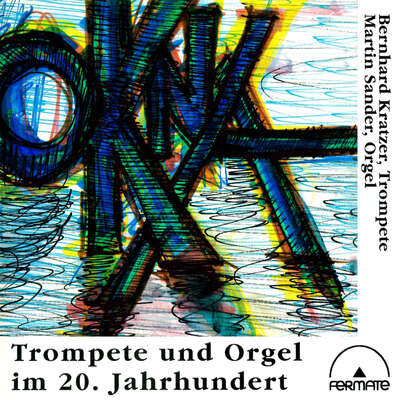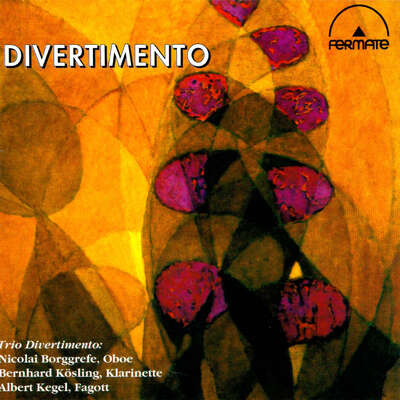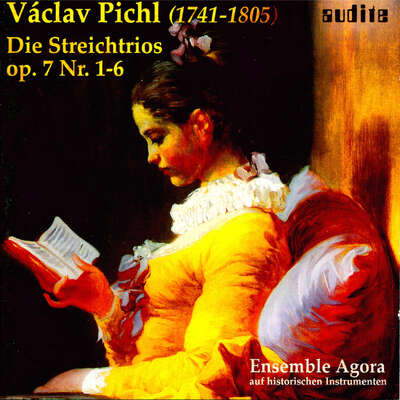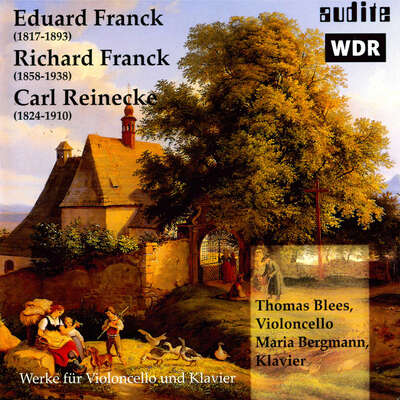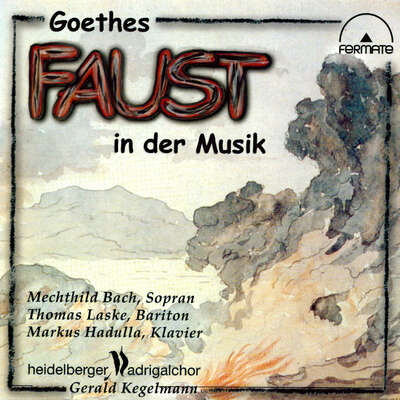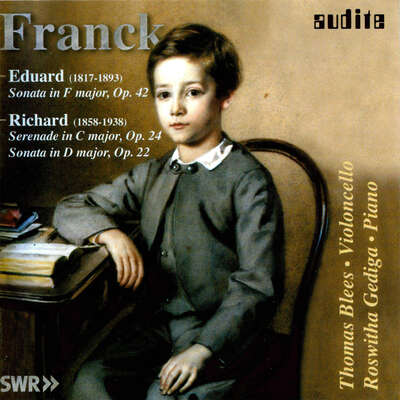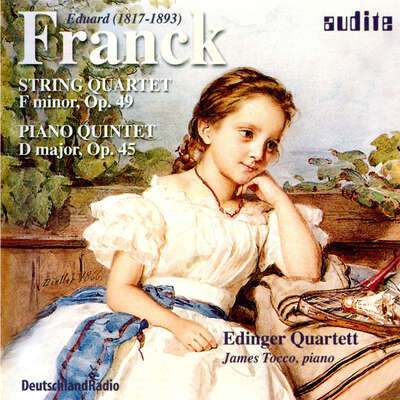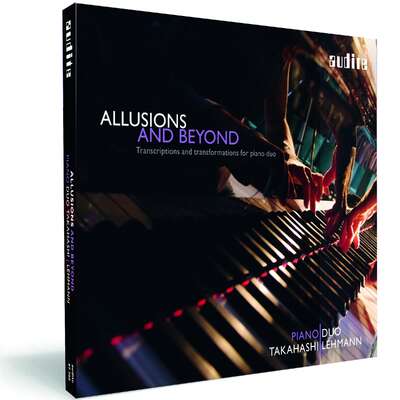
A tunefully harmonic approach to compositional complexity: Max Reger’s String Trios and Piano Quartet in a spirited recording by the Trio Lirico.more
"The Trio Lirico and pianist Detlev Eisinger are completely at one with Reger’s works and convince with a beautifully blended sonority and a refined musicianship." (Pizzicato)
Details
| Max Reger: Complete String Trios & Piano Quartet in A Minor, Op. 133 | |
| article number: | 97.714 |
|---|---|
| EAN barcode: | 4022143977144 |
| price group: | BCA |
| release date: | 22. September 2017 |
| total time: | 83 min. |
Bonus Material
Informationen
The violinist Franziska Pietsch and her Trio Lirico present their debut album on audite.
In between the poles of preserving tradition and striving towards fin de siècle modernism, Max Reger composed three works between 1904 and 1914/15 featuring a particular sense of clarity which the composer associated with Mozart. Even at their premieres, the two String Trios and the late Piano Quartet each caused a sensation, not least as their compositional complexity, for which Reger was (in)famous, mostly runs underneath the surface, creating an easier listening experience. These tuneful and harmonically rich works which, at times, enter into direct dialogue with works of the past, are rarely heard, even though they represent important cornerstones of their respective genres.
The Trio Lirico was founded in 2014 and soon established itself on the concert scene. The ensemble's varied repertoire ranges from classicism through to contemporary music. The three performers are brought together by their passion for chamber music; in addition, all three also enjoy solo careers. It is this soloistic influence within a chamber music formation that constitutes the trademark of the ensemble: the chamber music dialogue is conducted with soloistic passion without neglecting the ensemble's homogeneity. The result is a unique combination of enthusiastic and spirited music-making and attractive suspense. The Munich-based pianist Detlev Eisinger joins the ensemble for the Piano Quartet.
Reviews
Süddeutsche Zeitung | Magazin Heft 26/2019 27. Juni 2019 | Carolin Pirich | June 27, 2019
GEGEN DEN STRICH
Als sie jung war, blockierte die DDR ihre Karriere. Jetzt stößt sie an die Grenzen der Musikbranche. Aber Grenzen sind ihre Spezialität: die erstaunliche Geschichte der Ausnahmegeigerin Franziska Pietsch
Sie fragt: Vielleicht möchten Sie mich in Aktion sehen? Man hätte dannMehr lesen
www.elegantclassics.cz | 30.01.2019 | Miloš Bittner | January 30, 2019 | source: https://www.eleg...
Kompoziční styl obou skladeb je osobitý, nápaditý, svěží a originální. Nabízí přímý pohled do autorova hudebního i mimohudebního myšlení. Velmi jednoduše čitelné a veskrze příjemně poslouchatelné skladby jsou o to více vyzdvihnuty, když se jim dostává takové mistrné interpretace, jakou se Trio Lirico prezentuje - hudba sama totiž technicky vyspělé hráče vyžaduje. Je to hudební literatura, již se vedle skladatelské kvality dostává i té náročné interpretační a výsledek je potěšujícím způsobem náramně dobrý.Mehr lesen
Badische Zeitung | Mittwoch, 19. Dezember 2018 | Johannes Adam | December 19, 2018
Alles, was das Herz begehrt
Max Regers Spätromantik: CDs mit Orchesterwerken, Liedern, Chor-, Kammer- und Orgelmusik nebst DVD-Doku und Buch
Am 11.Mai 1916 starb in einem Leipziger Hotelzimmer der Komponist Max Reger 43-jährig an Herzversagen. Im Umfeld des 100. Todesjahres und alsMehr lesen
Grundlegend informieren kann man sich bei „Maximum Reger“ (Fugue State Films; Naxos). Dieses liebevoll realisierte Projekt, dessen Titel den Vornamen des Komponisten und den Superlativ wortspielerisch verknüpft, besteht aus sechs DVDs und fast 1000 Minuten Inhalt. Der Londoner Will Fraser („Ich liebe Max Regers Musik, seit ich sein Werk als Teenager entdeckte“) koppelt in der Dokumentation Leben und Werk. Fraser möchte für Reger eine Lanze brechen, ihn als großen Komponisten exponieren. Das Vorhaben gelingt. Susanne Popp, die Karlsruher Biographin (wir berichteten) und Päpstin der Reger-Forschung, kommt gesprächsweise zu Wort. Viel Musik ist zu hören – und eben auch zu sehen. Namhafte Reger-Interpreten sind in Aktion: etwa der Organist Bernhard Haas und der Pianist Markus Becker, der mit Regers gesamtem Klavierschaffen reüssiert hat. Bernhard Renzikowski, der an der Freiburger Musikhochschule lehrt, begleitet die Mezzosopranistin Frauke May an den Tasten. In Sachen Kammermusik tritt das Frankfurter Aris-Quartett auf den Plan.
Die Kammermusik bildet in Regers Schaffen gleichsam einen roten Faden: Opus 1 ist eine Violinsonate, am Ende steht das A-Dur-Klarinettenquintett op. 146. Den beiden luziden Streichtrios widmet sich exemplarisch das Trio Lirico (audite). Franziska Pietsch (Violine), Sophia Reuter (Viola) und Johannes Krebs (Cello) spielen mit viel Ausdruck – und treffen wunderbar die Intention des Komponisten. Präzis und wohldosiert sind im E-Dur-Larghetto des a-Moll-Trios op. 77b von 1904 die Vortragsanweisungen espressivo und dolce umgesetzt. Mit dem Pianisten Detlev Eisinger erfährt überdies das Klavierquartett a-Moll op. 133 aus der Meininger Zeit eine packende Wiedergabe. Jenes Opus, bei dessen Uraufführung 1915 im Leipziger Gewandhaus der Komponist den Klavierpart betreut hatte.
Eine mit den Klavierwerken (und der Kammermusik) vergleichbare Rolle kommt bei Reger der Gattung Lied zu. Rund 300 Klavierlieder hat er komponiert, von denen aber nur ganz wenige („Mariä Wiegenlied“) bekannt sind. Im Konzertbetrieb findet man sie kaum– weil diese Lieder nicht selten kompliziert sind. Reger, der Goethe für auskomponiert hielt, griff bevorzugt zur Lyrik von Autoren seiner eigenen Zeit. Auf ihrer CD „Songs by Max Reger“ (Hyperion) liefern die Sopranistin Sophie Bevan und der Pianist Malcolm Martineau 33 Exempel aus dem Reger’schen Liedfundus. Innig klingt da die Liliencron-Adaption „Glückes genug“, sehr luftig das Klavier bei der Dehmel-Versinnlichung „Waldseligkeit“. Auch wird offenkundig, dass Reger das Mackay-Gedicht „Morgen“ 1902 fast impressionistisch rezipiert, anders als Richard Strauss 1894. Wer sich mit dem Thema intensiver befassen möchte, dem bietet der von Jürgen Schaarwächter herausgegebene Band „Max Reger und das Lied“, der auf einer interdisziplinären Karlsruher Tagung basiert, Profundes und Detailliertes – so auch zu den Doppelvertonungen Strauss/Reger (Reger-Studien, Bd. 10, Carus Verlag, Stuttgart. 298 Seiten, 28,80 Euro).
Der lohnenden, gleichfalls kaum präsenten Reger’schen Resultate für Männerchor vorbildlich angenommen hat sich das Ensemble Vocapella Limburg – jene Formation, die man im Mai beim Deutschen Chorwettbewerb in Freiburg bewundern konnte. Auf zwei CDs (Rondeau) beweist der von Tristan Meister geleitete Chor seine Klasse. Man hört einen runden, warmen und in allen Stimmgruppen ausgewogenen Klang. Wobei der erste Titel auf der ersten CD wie ein antizipierter Kommentar zum Hitzesommer 2018 wirkt: „Die Erde braucht Regen“. Die Werke zeigen Reger als sehr fähigen Chorkomponisten, im dunklen Timbre mit Brahms verwandt.
Einer Großtat in puncto Reger kann sich – wer hätte das gedacht? – die Deutsche Grammophon rühmen. Auf zwölf CDs legt das Gelblabel Regers Orchesterwerke vor. Klar wird, wie er an seiner Aufgabe als Orchesterkomponist gewachsen ist. Man findet alles, was das Herz begehrt: klangsinnlich die Mozart-Variationen und die Romantische Suite, Walzer-Eleganz in der Ballett-Suite, zudem die Konzerte, den 100. Psalm. Vor allem der Dirigent Horst Stein und die Bamberger Symphoniker erweisen sich in Klang, Ausdruck und Farbe als hervorragende Reger-Exegeten. Erfreulich, dass das späte, Fragment gebliebene lateinische Requiem Berücksichtigung fand.
Max Reger ist der nach Bach bedeutendste deutsche Orgelkomponist. Dass die Münchner Musikhochschule, als Franz Lehrndorfer einst dort wirkte, diesbezüglich ein Oberzentrum war, dokumentieren zwei CDs mit historischen Aufnahmen. Die Mitschnitte aus dem Reger-Jahr 1966 („B-A-C-H“, „Morgenstern“-Fantasie) entstanden am obertonreichen, orgelbewegten Steinmeyer-Instrument im Konzertsaal der Münchner Hochschule („Franz Lehrndorfer – Live“, Vol. 9; Butz), die d-Moll-Sonate erklang 1978 an der Zeilhuber-Orgel des Liebfrauendoms („Franz Lehrndorfer – Live“, Vol. 10; Butz). Für diese Musik würde man heute grundstimmigere Instrumente bemühen und weniger mixturig verfahren. Zeitlos aber ist die klare Souveränität, mit der Lehrndorfer ein Extremwerk wie die sogenannte Inferno-Fantasie op. 57 von 1901 technisch und musikalisch bis hin zum Auskosten des Lyrischen gestaltet. Ja, solche Interpretationen sind Klassiker. Und die altern nicht.
Badische Neueste Nachrichten | Dienstag, 16. Oktober 2018 | sws | October 16, 2018 Expressiv
Die Abstimmung nicht nur der weit gespannten Dynamik ist ebenso überzeugend wie die Intonationssicherheit des „Trio Lirico“. Beim Klavierquartett tritt mit Detlev Eisinger ein gleich gestimmter Pianist hinzu, der ebenso wie die Streicher bereit ist, der Klangwelt Regers in all ihren Facetten nachzugehen.Mehr lesen
Fanfare | October 2018 | Gavin Dixon | October 15, 2018 | source: http://dev.fanfa...
Four releases are self-recommending, though the obscure repertoire on three and the purely technological reasons for the rerelease of the fourthMehr lesen
Reger’s chamber music is thankfully well served on record (German listeners remain receptive), but Trio Lirico here demonstrate that there is always room at the top. Their accounts of the two string trios and the Second Piano Quartet are light and lively, bringing out all the Mozartian elegance, yet without diminishing Reger’s always expansive musical gestures. […]
www.recordsinternational.com | 29/08/2018 | August 29, 2018 | source: https://www.reco...
The 1904 first string trio (1904) is a light, refreshing piece in the spirit of early Viennese Romanticism while the equally sunny and serenade-likeMehr lesen
Fanfare | July / August 2018 | Gavin Dixon | July 1, 2018
These three works all bring out Reger’s Mozartian sensibilities. The textures are clear and the movements are well structured and well proportioned.Mehr lesen
The German ensemble Trio Lirico do an outstanding job, giving performances that are light and buoyant, with beautiful clarity of texture and finely gauged balance between the instruments. Focused articulation helps to propel the lines, and the viola and cello in particular often display a woody, tactile attack, while the overall tone is suitably balanced between transparency and richness. Pianist Detlev Eisinger fits perfectly into the ensemble for the Piano Quartet. In all three performances, the string players indulge in some sweeping rubato gestures in the transitions—ideal for this music—and Eisinger seems to goad them even further, into daringly broad and opulent phrasing. The gamble always pays off.
As with most of Reger’s chamber music, the competition for these three works is select but strong. And, as usual, the benchmark is the MDG series from the 1990s. The string trios there, from the Mannheimer String Quartet (MDG Gold 336 0711 and 336 0722) are weightier in tone and recorded in a warmer and more ambient setting that is easier on the ear where these are more confrontational. Interpretively, they are similarly well executed and conveyed, so the two versions deserve joint top billing. But don’t miss the excellent version from the Vogl Trio on Gramola (98943). Their approach is lighter and more conversational in the counterpoint, lacking a little in drama but still impressive.
The MDG version of the Piano Quartet, again with the Mannheimer String Quartet, with pianist Claudius Tanski (336 0714) has a compelling sense of urgency in the first movement which Trio Lirico seem to lack, at least by comparison. But the audio quality on the new version is superior. The other versions available are not competitive: The Fanny Mendelssohn String Quartet (Troubadour 1415) is rushed, while the Aperto Piano Quartet (Naxos 8.570786) lacks focus and engagement, and neither version comes close to this or the MDG for audio quality.
Generous running time and an unusually well-translated booklet round out an attractive package. Just one complaint: The Audite label used to champion SACD. Its new approach seems to be to issue standard CDs, but with a high-resolution, surround-sound download equivalent. I’m sorry to have missed out on that, but it could potentially elevate this joint first into a clear winner.
American Record Guide | May/June 2018 | Don O’Connor | May 1, 2018
In these chamber works, the music is sometimes dense and dissonant, but at the same time these characteristics often combine to form music that’sMehr lesen
Trio 1 has a slow, soulful introduction, giving way to further emotional sounds. II has a sweet tune of near-Schubertian purity. It’s developed with intense feeling and innovative key changes by a man who wrote a book on that technique. III, a vigorous scherzo, has an athletic theme whose first and second phrases give the impression of being in different keys. IV pays homage to Mozart, especially the finale of Symphony 39. The debt is audible, but the music still has a life of its own transcending mere imitation.
Trio 2 has an expressive I, and II is even more poignant. It’s a set of variations, another Reger specialty. The brief—three-minute—last movement has a bouncing cello theme worked through with exceptional contrapuntal skill.
The opening bars of the quartet surge out to the listener, then taper down to starker voicing. The music builds to overwhelming richness and must be one of the most tremendous movements ever written for this medium. II, the scherzo, is a cute fugato. Its interlude has slower, more introverted music, developing over an uneasy syncopated pedal before the fugato theme returns. It wears its learning lightly. Much of III is a dialog between strings and keyboard. With its heartfelt arching lines, it gives the impression of a formal structure assembling itself. IV contrasts a sparkling opening in high register with a more legato melody. To use a contradiction, there’s a feel of weighty whimsy. A second theme has a gradually rising chromatic contour like the last movement of the composer’s Eichendorff Suite. The music concludes with Brahmsian depth and scope.
The playing on all three pieces is first-rate. The players have accurate intonation—not always a given with Reger—and full, steady tone quality. They also have complete sympathy with this music. The recording has resonant, close-up sound.
http://mz.kmpztr.ru | 10.04.2018 | Victor Schpinitzkij | April 10, 2018 | source: http://mz.kmpztr...
В преддверии 145‑летия со дня рожденияMehr lesen
Gramophone | March 2018 | Peter Quantrill | March 1, 2018
Once read, it's hard to forget, but best to lay aside Reger's claim for his Op 77b String Trio as satisfying the demands of his age for a new Mozart.Mehr lesen
If the steam of dumplings still rises from Reger's better-known chamber and orchestral music for some listeners – I'm rather partial to a dish of Griessklösschen myself – then they should find the calorie count more to their taste in the attenuated textures of the string trio, even in the more densely woven lines of Op 141b. The German Trio Lirico do a fine job of sounding more like a sextet, not without some effort caught by the microphones. Rival ensembles on Naxos and Gramola are also audibly taxed – somehow huffing and sighing are grist to the mill of the Regerian aesthetic – but I prefer the ebb and flow of the new recording, the opportunities for contrast and genial dialogue taken wherever they arise, such as in the serenade-like lilt of the first movement's second theme.
The Second Piano Quartet is one of those several works composed after Reger had had a close encounter with a Brahmsian archetype (in this case the C minor Quartet, Op 60), and there is even a furtive tip of the hat to his exemplar at the start of the development section. Here again a sympathetic recording balance is key to the success of the performance, placing Detlev Eisinger's contribution at a discreet distance while making clear that this is a partnership of musical equals.
Luister | maart 2018 | Quirijn Bongaerts | March 1, 2018
Het Trio Lirico brengt [...] met een enorm warme en rijke klank. Mehr lesen
Das Orchester | 02/2018 | Alexander Walther | February 1, 2018
Insgesamt gelingt es den Solisten auf dieser CD vorzüglich, die tief empfundenen Stimmungs- und Charakterbilder nuancenreich nachzuzeichnen. Die schöpferische Auseinandersetzung mit den verschiedenen Spieltechniken steht so immer wieder in reizvoller Weise im Mittelpunkt.Mehr lesen
Diapason | N° 665 fevrier 2018 | Jean-Claude Hulot | February 1, 2018
Toujours soucieux de mettre ses pas dans ceux de ses augustes modèles, Max Reger ne pou – vait pas passer à côté du trio à cordes illustré parMehr lesen
Le Trio Lirico, formation allemande créée en 2014, maîtrise les codes très spécifiques du Reger tardif (entre épure et tension harmonique extrême). Detlev Eisinger apporte une densité du son toute brahmsienne au Quatuor op. 133, dont il fait un chef-d’œuvre comparable au Quintette avec clarinette op. 146, avec une plus grande décantation que dans le Quatuor op. 113. Ce programme original n’a pour concurrence que la série MDG du Quatuor de Mannheim avec Claudius Tansky, aux couplages différents. La version des quatuors avec piano par le Quatuor Elyséen, dans l’ancienne intégrale Da camera Magna, s’incline devant les nouveaux venus.
www.musicweb-international.com | Monday January 29th | Stephen Greenbank | January 29, 2018 | source: http://www.music...
I can understand why many find Reger's music unforgiving and daunting. It took me a while to crack the hard shell of the nut. Once I did, after muchMehr lesen
“It is absolutely clear to me that what our present age lacks is a Mozart” declared Reger in June 1904. The result was the String Trio No. 1 in A minor, Op. 77b. It was premiered in November of that same year to great critical acclaim. It sounds quite extrovert at times, almost certainly in an attempt to capture some of that Mozartian lightness. After a solemn introduction, the opening movement suddenly springs to life, the energetic thrust alternates with contrasting lyrical warmth. A tender Larghetto follows, reflective in disposition. The good-humoured Scherzo sounds quite neoclassical in style. Quoting a theme from Mozart's Abduction from the Seraglio, the finale cannot fail to raise a smile.
I, personally, find the String Trio in D minor, Op. 141b the more attractive of the two; maybe this is the reason why it is positioned first on the CD. A late work, it was completed in 1915, a year before Reger’s untimely death. It is a reworking of a Flute Serenade, Op. 141a, and is structured in three movements. Despite the glow of the opening movement, there is a pervading sadness and sense of longing. This is followed by a theme and variations, elegant and skilfully etched. The Vivace, which ends the work, is sun-soaked, with a playful abandon. The Trio proved popular with public and critics alike after the first performance, and it is hardly surprising.
The Trio Lirico join forces with pianist Detlev Eisinger for an impassioned reading of the Piano Quartet No. 2 in A minor, Op. 133. The work was begun in 1914 and premiered at the Leipzig Gewandhaus in February 1915. It was published a year later. At the time, the critics praised its “glorious sororities” and its “vocal, vivid and catchy” melodies. For me, there are powerful echoes of Brahms in the music. Reger's often dense, syrupy textures and virtuosic piano writing are a notable feature of the intensely passionate opening movement. A frolicsome Vivace follows, offering some light relief. A noble, ardently-etched Largo precedes a spirited finale.
The Trio Lirico was formed in 2014, and this is their debut CD. Recorded last year, it marks the centenary of the composer's death on 1916. These are stunning performances, with precision ensemble. The Trio are utterly committed to the music and their interpretations are thoroughly convincing. Detlev Eisinger I would equally praise for the passion, energy and refinement he brings to the Piano Quartet. Audite's plush sound is another asset. For the uninitiated, especially, this constitutes a highly recommended Reger chamber music primer.
BBC Radio 3 | Sat 20 Jan 2018, 9.00 am | Andrew McGregor | January 20, 2018 | source: http://www.bbc.c...
BROADCAST
BBC Radio 3 Record Review
They have the tone to match don’t they. Very warm, very rich and soupy, it’s lovely.Mehr lesen
De Gelderlander | 30-12-17 | Maarten-Jan Dongelmans | December 30, 2017 | source: https://www.geld... Waar droomdebuut voor Trio Lirico
Zelden heb ik zo'n emotionele weelde bij slechts drie strijkers beluisterd. [...] Wat een rijkdom aan suggestie, sfeer en afwisseling. [...] deze release vormt voor dit drie jaar jonge ensemble een waar droomdebuut op Audite.Mehr lesen
Der neue Tag | 21.12.2017 | Peter K. Donhauser | December 21, 2017 | source: https://www.onet...
Oberpfälzer Komponist im Wechselbad der Gefühle
Das Trio Lirico und Detlev Eisinger präsentieren Reger
[...] der Klang ist ausgesprochen direkt, als säße man geradezu in Griffweite der Musiker. Jeder Bogenansatz, jede der reichhaltigen Klangfarben ist glasklar zu hören. [...] Ein reger Reger-Genuss!Mehr lesen
WDR 3 | TonArt | 15.12.2017 | Marcus Stäbler | December 15, 2017 | source: https://www1.wdr... BROADCAST
Das Trio Lirico kostet die sanglichen Melodien von Regers Musik genüsslich aus [...] demonstriert ein hohes technisches und künstlerisches Niveau. [...] Wer Max Reger sonst als zu sperrig erlebt und deshalb nur schwer einen Zugang zu seinem Schaffen findet, sollte dem Album eine Chance geben. Es lohnt sich.Mehr lesen
Audio | 12/2017 | Andreas Fritz | December 1, 2017
Max Regers Musik gilt als spröde. Diese Einspielung zeigt, dass der Komponist auch anders konnte: klar und klassizistisch, zuweilen fast eingängig.Mehr lesen
The Scotsman | Monday, 20.11.2017 | November 20, 2017
The performers are the Trio Lirico and pianist Detlev Eisinger, whose performances elicit the rich complexities as well as the clarity of Reger’s writing.Mehr lesen
www.pizzicato.lu | 09/11/2017 | Uwe Krusch | November 9, 2017 | source: https://www.pizz... Der zugängliche Reger
Viele Werke von Max Reger zeichnen sich durch eine erweiterte Harmonik aus, der es an Regeln zu fehlen scheint, sowie durch eine mitunter sprödeMehr lesen
Obwohl die Doppelopus Nummern 77 und 141 mit gut zehn Jahren Abstand entstanden sind, eint sie doch die einfachere Struktur. Diese äußert sich beispielweise in weniger ausgeprägter chromatischer Fortschreibung und häufiger eingesetzter paralleler Stimmführung zweier Instrumente. Auch das Zweite Klavierquartett folgt dieser Entwicklung. Diese Veränderungen im Stil führten in der zeitgenössischen Kritik sogar zur Vermutung eines Karnevalsscherzes, weil dieser ohnehin Reger ablehnende Kritiker diese Einfachheit nicht deuten konnte. Der Erfolg beim Publikum und bei der anderen Kritikern war jedoch groß.
Das ‘Trio Lirico’ hat in der kurzen Zeit seines Bestehens schon eine außerordentliche Reife erreicht, die sich in einem ausgeglichenen homogenen Spiel äußert, das jedoch die persönlichen und instrumentalen Eigenheiten seiner Mitglieder nicht leugnet.
Für das Klavierquartett haben sie den Pianisten Detlev Eisinger eingebunden. Diese Ergänzung ist völlig unproblematisch, da er auch der Duopartner der Geigerin des Trios, Franziska Pietsch, ist und mit ihr auch schon einige Einspielungen vorgenommen hat. Diese Aufnahme scheint die Premiere des Trios auf dem Tonträgermarkt zu sein. Dazu kann man ohne Zweifel sagen, dass das Ensemble, auch mit dem Pianisten, einen famosen Start hingelegt hat, der die Hoffnung auf weitere erfolgreiche Schritte begründet.
For a large part of the audience, Max Reger’s chamber music is often difficult to access. With his two string trios and the second piano quartet however, the composer has written a more catchy music. The Trio Lirico and pianist Detlev Eisinger are completely at one with Reger’s works and convince with a beautifully blended sonority and a refined musicianship.
www.amazon.de | 27. Oktober 2017 | October 27, 2017 | source: https://www.amaz... Streichtrio: sehr sangliche Darbietung aller Stimmen
Ich hatte mir das Streichtrio op.144b downgeloaded. Ich kenne davon mindestens zwei alternative Einspielungen, aber diese hier ist besonders: AlleMehr lesen
Auch kann man die Bratschenstimme deutlich von der Violinstimme unterscheiden, da die Instrumente räumlich getrennt positioniert sind: links die Violine, rechts die Bratsche, das Cello in der Mitte. Da kommt die Polyphonie im Stereopanorama optimal zur Geltung.
www.opusklassiek.nl | oktober 2017 | Aart van der Wal | October 1, 2017 | source: https://www.opus...
In het voorwoord van haar Reger-biografie schreef Susanne Popp: ‘WerkMehr lesen
Die Presse | 23.08.2017 | Wilhelm Sinkovicz | August 23, 2017 | source: http://diepresse... Das Trio Lirico und Pianist Detlev Eisinger liefern einen guten Einstieg in Max Regers Klangwelt
Das deutsche Trio Lirico und Pianist Detlev Eisinger dröseln die dennoch nicht ganz unkomplizierten Stimmengeflechte quasi spielerisch auf, musikantisch im besten Sinne des Wortes. Mehr lesen
